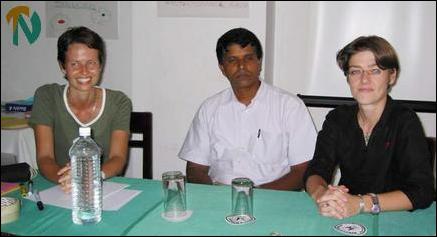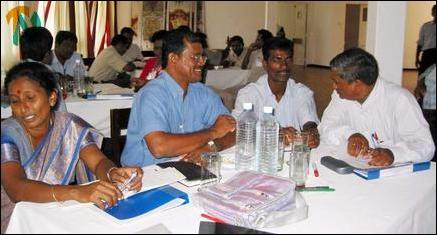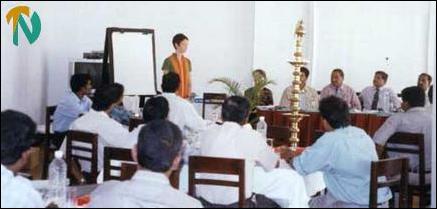UNICEF launches programme on HIV/AIDS for NE
[TamilNet, Monday, 22 September 2003, 07:08 GMT]
The UNICEF organized five-day training of trainers programme for a group of trainees on Life Skills Based Education (LSBE) on HIV/AIDS and substance abuse prevention among young people affected by the conflict in
the northeast province concluded last week in Trincomalee. The trained resource personnel would begin their training programme in their respective areas in the province in the coming weeks to take forward the LSBE on HIV/AIDS at the grass root level organizations, UNICEF sources said.
The training programme was the first of its kind in the conflict-affected province, the sources said.
The Provincial Director of Education, Mr.S.Mahalingam, inaugurated the programme, which was conducted from Monday to Friday last week at the Trincomalee Hotel Club Oceanic. Provincial health ministry officials
addressed the conference.
The chief co-ordinator of the training programme
was UNICEF Regional Project Officer (HIV/AIDS) Ms. Ulrike Gilbert, who is working in the UNICEF's regional office for South Asia, located in Katmandu, capital of Nepal. The UNICEF's Trincomalee zone head, Ms. Gabriele Elroy
also participated, sources said.
" We have trained a group of thirty two participants from the districts of the northeast province. Participants represented health, education, youth service, non-governmental organizations and two from the health and
education units of the Liberation Tigers of Tamil Eelam (LTTE),"said Dr.Harischandra Yakandawala, UNICEF's Consultant for Adolescent and HIV/AIDS unit in Colombo, who is also the additional co-ordinator of the programme, sources said.
 ( l-r) Ms Gabriele Elroy ( UNICEF Trincomalee head), Dr.Harichandra Yakandawala, UNICEF consultant and Ms. Ulrike Gilbert, UNICEF South Asia Regional Project Officer based in Kathmandu, Nepal are seen
( l-r) Ms Gabriele Elroy ( UNICEF Trincomalee head), Dr.Harichandra Yakandawala, UNICEF consultant and Ms. Ulrike Gilbert, UNICEF South Asia Regional Project Officer based in Kathmandu, Nepal are seenWhile HIV/AIDS and armed conflict have long been recognized as critical issues, the link between them and their impact on children are just now moving on to the international agenda, said UNICEF sources.
Lectures delivered at the training focused on life skills based educational approach, psychosocial counseling, substance abuse, understanding adolescent sexual and reproductive health issues, facts and fiction about HIV/AIDS, identifying risk behaviors related to HIV/AIDS and sexually transmitted
infections (STIs), communication skills, stigma and discrimination related to HIV/AIDS and thinking about future and developing a plan, sources said.
"Crowded, unsafe displacement and refugee camps also expose women and children to the risk of sexual violence. Lacking structures to equip people with information about prevention, and with little recreation, reproductive
health services or learning opportunities, camp life is conducive to the spread of HIV/AIDS," participants of the trainers' programme were told.
UNICEF officials told the participants that "conflict creates and exacerbates the conditions-and the human right abuses-in which the HIV/AIDS crisis flourishes. These include the disintegration of communities, displacement,
the separation of children from their families, rape and sexual violence,
and the destruction of schools and health services."
 A section of the particpants at the training.
A section of the particpants at the training."Tackling HIV/AIDS is a key priority for UNICEF," the UNICEF said in a report on HIV/AIDS and children affected by armed conflict.
Through its medium term strategic plan for 2002-2005, the UNICEF said it is helping to prevent new infections and care for children infected and affected by the epidemic, including in conflict countries.
Specifically, in situations of armed conflict, the UNICEF said its main priority is to "assess and analyze the extent and causes of children's and young people's vulnerability to HIV/AIDS, particularly that caused by displacement, sexual violence, lack of protection, and economic desperation.
The UNICEF will also advocate for the "protection of children and young people from sexual violence and exploitation and for the provision of information, education and services to prevent HIV and support the actions of government, non-state entities, NGOs, civil society and community organizations to prevent and respond sexual violence and exploitation, inform young people HIV and how to prevent it and ensure access to essential health services."
According to the UNICEF report, HIV/AIDS is already having a far reaching impact on children. To date, 13.4 million children currently under the age of 15 have lost one or both parents to AIDS. Children also make up 20 million of the world's 40 million displaced and refugee people. "When children and young people are forced to flee their homes because of armed conflict, their vulnerability to violence, abuse and exploitation-all key risk factors for HIV- increases greatly."
" As families break up and services are destroyed, the combined impact denies children and young people their
rights, including to special protection in time of conflict and to the services, information and skills that could help them remain free from HIV," the report said.
 Ms. Elroy speaking.
Ms. Elroy speaking.









